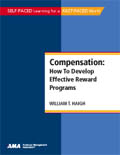Compensation
Author: William T. Haigh
Credit: 2.0 CEUs
Testing Format: multiple choice
Your Price: $159.00
ISBN: 9780761213703
Format: Book
Overview
Develop a compensation program that positions your company for success.
This course will give you a solid, fundamental overview of the field of compensation and serve as a primary resource as you implement new programs or improve existing ones.
Course Objective: Gain information and skills needed to implement new or improve existing compensation programs.
Selected Learning Objectives
• Determine and maintain pay levels that will attract, retain, and motivate
• Develop compensation policy guidelines that reflect the company’s values and culture
• Meet the seven basic objectives when implementing an effective compensation plan
• Integrate performance, productivity and business results into the compensation process
• Adjust compensation plans to address a company’s changing needs
Testing Format
This course contains one multiple choice test valued at one Continuing Education Unit (CEU) and one examination case valued at one Continuing Education Unit (CEU).
Table of Contents
About This Course
How to Take This Course
1. The Basics of a Compensation Program 1
Compensation and Human Resources Management
The Role of Compensation in Enterprise Management
Compensation Policy
Objectives of an Effective Compensation Program
Serve All Stakeholders
Be Simple
Identify Compensation Needs
Group Employees Properly
Include a Process for Developing a Compensation Program
Reflect Company Culture and Values
Be Skilled in the Art of Managing Change
Summary
Review Questions
2. The Elements of Compensation 11
Financial Elements of Compensation
Types of Financial Compensation
The Magnitude of Financial Payments
Nonfinancial Elements of Compensation
Types of Nonfinancial Compensation
The Value of Nonfinancial Compensation
Compensation Management
Summary
Review Questions
3. Job Evaluation 23
The Traditional Job Evaluation Approach
The Ranking System
The Classification System
The Point Evaluation System
Factor Comparison System
Combination Systems
Technical Factors of Job Evaluation Methods
Market Classification Systems
The Administration of Job Evaluation Programs
Satisfying Job Information Needs
Keeping the Program Up-to-Date
Giving Proper Consideration to Compliance Matters
Communicating Results to Employees
New Approaches to Bases for Pay
Summary
Review Questions
4. Market Surveys 35
Market Data
Availability of Market Data
Defining and Selecting Benchmark Jobs
The Nature of Labor Markets
The Proper Sample of the Market
Survey Methods
Recommendations
Use of Survey Data
Compensation Increase Surveys
Compensation Practices Surveying
Summary
Review Questions
5. Salary Structure 47
Technical Features of a Salary Structure
Slotting Benchmark Jobs into the Structure
Positioning the Structure to the Market
Adjusting the Salary Structure
The Use of Salary Structures
Special Problems and Issues
Salary Grades and Levels
Summary
Review Questions
6. Salary Actions 59
General Salary Increases
The Need for General Increases
Methods of Granting General Increases
Cost of Living Adjustments and Indexing
Basic Approaches to Individual Salary Actions within Salary Grade
Single-Rate Approach
Automatic Approach
Informal Approach
Merit Pay Approach
Managing Salaries within a Salary Grade
Other Salary Actions
Promotions
Demotions
Reevaluation and Inequity Increases
Special Cases
Summary
Review Questions
7. Pay for Performance 71
Performance, Productivity, and Business Results
Performance Reward Systems in Business
Types of Performance Rewards
Salary Reward for Performance
Basic Principles of Performance Salary Systems
Rating Performance
Translating Performance into Pay
Performance Salary Increase Guidelines
Economic Performance Increase Systems
Operating Problems of Performance Pay Increases
Incentive Pay Plans
Summary
Review Questions
8. Planning, Control, and Administration of Salaries 87
Planning
Operational and Strategic Plans
Budgets
Salary Planning
Control
Information
Review and Approval
Distribution Controls
Monitoring Results
Administration
Administrative Tasks
Legal Compliance
Questions and Complaints
Summary
Review Questions
9. Management Compensation 101
Management Salaries
Market Pricing
Fair Salaries
Salary Structure and Job Classification
Salary Increase Practices
Annual Bonus Award Plans
Types of Bonus Plans
Incentive Pay Standards
Types of Incentive Compensation Plans
Management Bonus Plan Issues
Long-term Income Plans
Long-term Income Standards
Alternative Long-term Income Plans
Trends in Long-term Plans
Issues with Respect to Long-term Income
Special Management Benefits
A Model Management Compensation Program
Guidelines for Management Salaries
Guidelines for Management Bonus Plans
Guidelines for Long-term Income Plans
Summary
Review Questions
10. Employee Benefits and Retirement Plans 121
Types of Benefits
Health Care Benefits
Disability and Sickness Insurance
Life Insurance
Legally Required Payments
Vacations
Holidays
Employee Services
Prepaid Legal Services
Education
Financial Assistance
Outplacement
The Unique Company Benefit
Designing the Employee Benefits Program
Administering the Benefits Program
Health Care Cost Containment
Retirement Plans
Sources of Retirement Income
Essential Features of Private Retirement Plans
Problems with Private Retirement Plans
A Rethinking of Private Pension Plans
A New Retirement Income Strategy
Summary
Review Questions
The First Examination
The Practice Case
The Practice Case Solution
The Examination Case
Selected Readings
Index

